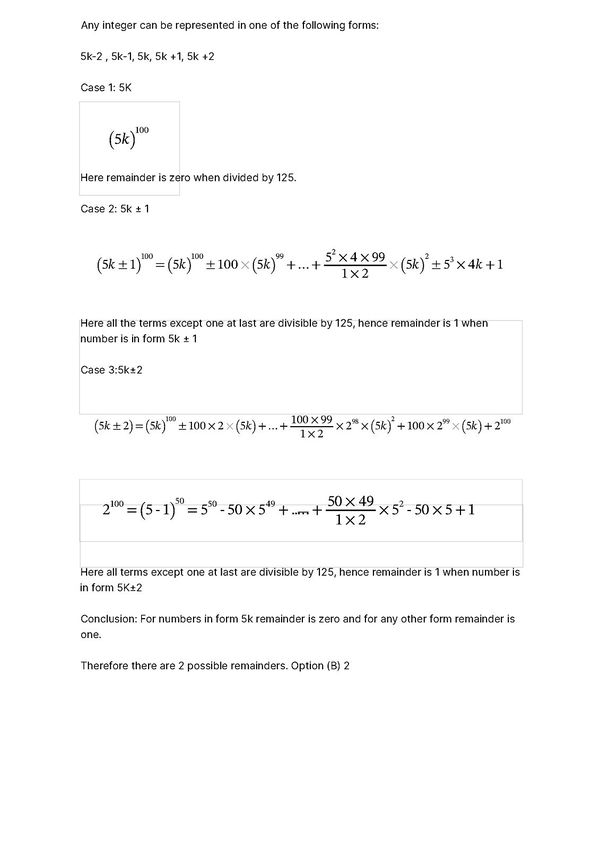Difference between revisions of "2024 AMC 10B Problems/Problem 18"
(Solution 8 (Binomial Theorem)) |
Numerophile (talk | contribs) (→Video Solution 1 by Pi Academy (Fast and Easy ⚡🚀)) |
||
| Line 69: | Line 69: | ||
~Kathan | ~Kathan | ||
[[Image: 2024_AMC_12B_P18.jpeg|thumb|center|600px|]] | [[Image: 2024_AMC_12B_P18.jpeg|thumb|center|600px|]] | ||
| + | |||
| + | ==See also== | ||
| + | {{AMC10 box|year=2024|ab=B|num-b=17|num-a=19}} | ||
| + | {{AMC12 box|year=2024|ab=B|num-b=13|num-a=15}} | ||
| + | {{MAA Notice}} | ||
Revision as of 14:21, 14 November 2024
- The following problem is from both the 2024 AMC 10B #18 and 2024 AMC 12B #14, so both problems redirect to this page.
Contents
[hide]Problem
How many different remainders can result when the ![]() th power of an integer is
divided by
th power of an integer is
divided by ![]() ?
?
![]()
Fast Solution
https://www.youtube.com/watch?v=S7l_Yv2Sd7E
Solution 1
First note that the totient function of ![]() is
is ![]() . We can set up two cases, which depend on whether a number is relatively prime to
. We can set up two cases, which depend on whether a number is relatively prime to ![]() .
.
If ![]() is relatively prime to
is relatively prime to ![]() , then
, then ![]() because of Euler's Totient Theorem.
because of Euler's Totient Theorem.
If ![]() is not relatively prime to
is not relatively prime to ![]() , it must be have a factor of
, it must be have a factor of ![]() . Express
. Express ![]() as
as ![]() , where
, where ![]() is some integer. Then
is some integer. Then ![]() .
.
Therefore, ![]() can only be congruent to
can only be congruent to ![]() or
or ![]() . Our answer is
. Our answer is ![]() .
.
~lprado
Solution 2 (Euler Totient)
We split the cases into:
1. If x is not a multiple of 5:
we get ![]()
2. If x is a multiple of 125: Clearly the only remainder provides 0
Therefore, the remainders can only be 1 and 0, which gives the answer ![]() .
.
~mitsuihisashi14
Solution 3
Note that
![\[(5+n)^{100} = {100 \choose 0} 5^{100} + {100 \choose 1} 5^{99} n + {100 \choose 2} 5^{98} n^2 + \cdots + {100 \choose 97} 5^3 n^{97} + {100 \choose 98} 5^2 n^{98} + {100 \choose 99} 5 n^{99} + {100 \choose 100} n^{100}.\]](http://latex.artofproblemsolving.com/5/d/7/5d7727afc558493f3ff5c0886691406de554f427.png)
Taking this mod ![]() , we can ignore most of the terms except the for the last
, we can ignore most of the terms except the for the last ![]() :
:
![\[{100 \choose 98} 5^2 n^{98} + {100 \choose 99} 5 n^{99} + {100 \choose 100} n^{100} \equiv 4950 \cdot 5^2 n^{98} + 100 \cdot 5 n^{99} + n^{100} \equiv n^{100} \pmod {125},\]](http://latex.artofproblemsolving.com/5/d/f/5df4b0edc2171c15c0b53ae849e3b0bda0526735.png)
so ![]() . Substituting
. Substituting ![]() for
for ![]() , we get
, we get ![]() . Therefore, the remainders when divided by
. Therefore, the remainders when divided by ![]() repeat every
repeat every ![]() integers, so we only need to check the
integers, so we only need to check the ![]() th powers of
th powers of ![]() . But we have that
. But we have that ![]() and
and ![]() , so we really only need to check
, so we really only need to check ![]() . We know that
. We know that ![]() produce different remainders, so the answer to the problem is either
produce different remainders, so the answer to the problem is either ![]() or
or ![]() . But
. But ![]() is not an answer choice, so the answer is
is not an answer choice, so the answer is ![]() .
.
Solution 4 (Totient)
Euler's Totient Function, ![]() returns
returns ![]() as a product of each prime divisor of
as a product of each prime divisor of ![]() .
.
Euler's Totient Theorem states that if ![]() is an integer and
is an integer and ![]() is a positive integer relatively prime to
is a positive integer relatively prime to ![]() , then
, then ![]() .
.
In this case, ![]() , which is convenient because
, which is convenient because ![]() only has one prime factor,
only has one prime factor, ![]() , therefore
, therefore ![]() , so
, so ![]() where
where ![]() . Every single number that isn't a multiple of
. Every single number that isn't a multiple of ![]() is relatively prime to
is relatively prime to ![]() , therefore we have two cases:
, therefore we have two cases:
1) ![]()
2) ![]()
The answer is ![]() ~Tacos_are_yummy_1
~Tacos_are_yummy_1
Video Solution 1 by Pi Academy (Fast and Easy ⚡🚀)
https://youtu.be/c6nhclB5V1w?feature=shared
~ Pi Academy
Solution 8 (Binomial Theorem)
~Kathan
See also
| 2024 AMC 10B (Problems • Answer Key • Resources) | ||
| Preceded by Problem 17 |
Followed by Problem 19 | |
| 1 • 2 • 3 • 4 • 5 • 6 • 7 • 8 • 9 • 10 • 11 • 12 • 13 • 14 • 15 • 16 • 17 • 18 • 19 • 20 • 21 • 22 • 23 • 24 • 25 | ||
| All AMC 10 Problems and Solutions | ||
| 2024 AMC 12B (Problems • Answer Key • Resources) | |
| Preceded by Problem 13 |
Followed by Problem 15 |
| 1 • 2 • 3 • 4 • 5 • 6 • 7 • 8 • 9 • 10 • 11 • 12 • 13 • 14 • 15 • 16 • 17 • 18 • 19 • 20 • 21 • 22 • 23 • 24 • 25 | |
| All AMC 12 Problems and Solutions | |
The problems on this page are copyrighted by the Mathematical Association of America's American Mathematics Competitions. 










